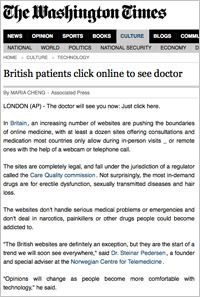The Dr Fox online clinic featured in a widely seen press article in 2010. The journalist, Maria Cheng of Associated Press, has done excellent research on online medicine.
The article entitled British patients click online to see doctor included the following:
Dr. Patrick Cadigan, a cardiologist and spokesman for Britain’s Royal College of Physicians, described Internet-based medicine as “second-best,” and said it was particularly difficult to make a diagnosis without seeing a patient in person. “To lose personal contact with your patients means you lose clues about what may be wrong with them,” he said.
Dr. Lori Heim, president of the American Academy of Family Physicians, said “The best thing is to have a relationship with your physician because you’re more likely to get a better diagnosis”.
Whilst both these statements are true, as a doctor who runs an online clinic, I would make the following points:
Online clinics do not replace office doctors; they augment them. Although the vast majority of medicine cannot be practiced online, some services are provided well online.
The Dr Fox website does quite a few things. The main thing it does is inform and advise. We give guidance on medical conditions and their treatment. We are cautious in our advice, recommending when it is best for a person to see a doctor face-to-face, or when a particular medicine is not suitable.
Statistically speaking, for each item we prescribe, our website pages are viewed about 80 times for 52 minutes. This does not mean that each patient making an order has seen this many pages or spent this much time on our website. 95% of visitors to our site do not make an order. However, it does mean a lot of information is imparted for each prescription issued. The amount of good information given about drugs provided is probably better than a doctor can usually manage face to face in the time an appointment is allocated.
The checks we carry out are thorough and systematic. People can only make an order where the medicine is suitable for them. There is very little incentive for people to deceive to obtain medicines because, apart from erectile dysfunction treatment, the other 90% of what we provide has no abuse potential of any sort. Patients seen face to face can also give inaccurate information to their doctor.
It is possible to be negative about online clinics as suboptimal when compared with a surgery visit. However, many people who obtain medicine on the web will not attend a surgery if the online option is not there. Some people are too embarrassed and they know the medicine they are looking for is not available free on the NHS, including malaria tablets, Propecia and certain ED treatment.
Online clinics provide a selected range of prescription medicines delivered conveniently to people’s doors. The art, if that is the right word, is to know what not to prescribe and when not to treat. It comes down to selection.
Dr Fox has issued thousands of prescriptions and as yet has had few complaints, mostly related to Royal Mail delivery issues.
Regulated websites also perform a public good in keeping patients out of the hands of those selling counterfeit medicines or other ineffectual remedies. It is better for patients to get their ED treatment from a regulated UK online clinic and registered pharmacy than take fake and potentially poisonous medicine from unregulated overseas websites, or for a person who needs genuine medicine to waste their money on something ineffective.
It is worth noting Dr Fox prices are about half of all other online clinics. Patients who find the Dr Fox website are even less likely to buy dangerous medicine from bogus sites.




